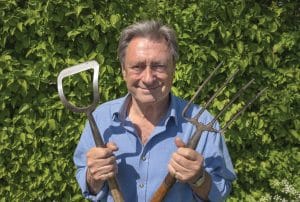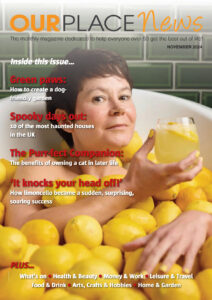As Alan Titchmarsh launches a new show, he talks about career changes, the joy of gardening, and reducing his carbon footprint.

There is one thing you can be sure of following an interview with Alan Titchmarsh. The much-loved gardener, presenter, and novelist, who turns 72 in May, will not be leaving his career behind any time soon.
“People say, ‘Why don’t you retire?’ And you say, ‘Well, if I retire, I’ll have to find something to fill the time’,” quips the Ilkley-born star, on a video call from his study (it is in the attic of a barn, and he moves his camera to show the stunning views out over his garden).
“I could drive a minibus for people – but perhaps I’m better off doing what I do. Just maybe just a little bit less of it.”
While he says he’ll never give up work entirely, he muses reflectively: “I like to think I know when to stop doing something.
I did seven years of Gardeners’ World, six years of Ground Force, 10 years of Pebble Mill At One, seven years of the chat show (The Alan Titchmarsh Show); I like to think I go, ‘I’ll park that one now’ before people go, ‘Oh get him off!’”
Following the success of Love Your Weekend With Alan Titchmarsh, which started in 2020, ITV is now launching a brand new primetime show.
The nine-part series, set in the heart of Hampshire, where Titchmarsh lives in a Grade II-listed Georgian farmhouse, will cover farming and animal life, and where and when to plant for the coming year.
Plus, each week there will be a celebrity guest joining him for planting, nature features and food tastings.
It is airing at a great time; warmer months are coming, and everyone has realised after being in lockdown, just how important fresh air for “keeping us sane”.
Many people have also realised the huge wellbeing benefits of gardening, which Titchmarsh sums up perfectly, noting how nurturing and caring for plants is “good for the soul and the spirit”.
“The technological revolution has covered it up in a lot of people, it’s sort of submerged it, and people are very tech-savvy, which I’m not.
Over the generations, they’ve lost the ability to feel for nature. With me, it’s very instinctive. I’m quite a primitive person, but I love that aspect of it – the feeling that I’m participating in it.
Also, gardeners are the only interactive naturalists. A lot of naturalists are spectators, bird watching or whatever.
But with us, we take cuttings, we sow seeds, we plant things, so we are involved, we are interacting with nature and encouraging it along, and it’s a wonderful feeling when it responds.”
What Titchmarsh wants to stress is that you don’t have to have a lot of land; you could just have a plant pot on your doorstep, for example. “I don’t want to make it a chore or to be bullying or hectoring, but just to say, ‘Why don’t you have a go at this?’”
He campaigned long and hard during the first lockdown in spring of 2020 to get garden centres open, “and mercifully in the second lockdown, they stayed open”.
Titchmarsh had the first dose of the Covid-19 vaccine on February 1 and, discussing how there are people questioning whether to have it or not, he urges them to “get it in your arm!”
Suggesting there’s a “far greater risk not having it”, he gets emotional remembering all the volunteers shepherding him into the vaccination centre, and the work that has gone into make the jab possible.
“I think there’s so much anger at the moment, and bitterness and crossness about everything, and when you think what we’ve
achieved, and particularly with Oxford-AstraZeneca…
I had the AstraZeneca, which I was really rather chuffed about. I had no reaction at all. I barely felt it go in. I had no pain in my
arm afterwards – no symptoms whatsoever.
“My second one’s on April 25, and I just feel an enormous sense of gratitude and appreciation to the people who have worked on
it to get it at such speed.”
What would Titchmarsh say living through a year of a global pandemic has taught about himself? “I can’t tell you how it felt for people who are in blocks of flats who have been told stay at home, ‘You’re allowed one walk a day’.
I don’t know whether I would have survived that, and I take my hat off to them for being able to. I’ve always been a man of the land, ever since I was little boy, and I grew up in the Yorkshire Dales so the wider open spaces are my territory.
“To have a bit of land here and beyond that, I don’t take it for granted at all. It’s reinforced my belief that I did the right job when
I left school at 15, but also that I am never happier than when I’m out there, on that earth, pottering and doing it.”
The presenter, who married his wife Alison in 1975, has, of course, missed being able to see his friends, two daughters, and
four grandchildren.
“We are social animals,” he notes. “We’re like ants, we function together, and that’s been very hard – and it’s not to be underestimated, the ramifications that having been pulled apart will have, in some families.”
But lockdown has also made him realise just how much he likes being here, on his bit of Hampshire land.
Work-wise, he currently does his Saturday morning radio show on Classic FM, plus all his voiceovers, from home, and that there’s another reason for that, too: to help look after the planet.
“Yes, I’ll go into town and touch base with folk, but in the future I shall work heavily on saying to people, ‘Look, it makes much
more sense for me to do it from here’ because it’s much more responsible climatically apart from anything else, and I can make a difference,” he suggests.
“My little bit, it’s only a little bit, but not everything is empirical. We all feel powerless when we talk about global warming, climate change, on a grand scale; ‘What can I do?’ I can do what I’m doing; not go on the train, not drive.
I can do it all here, and it makes sense to do that.”
(Article source: Silver Surfers)

